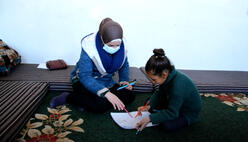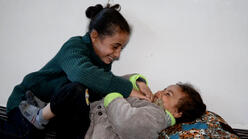“I loosen myself like a tree,” explains 8-year-old Reem* as she imitates the motion of a branch flowing in the wind. “Then I breathe in, like this.”
Reem takes a deep breath, closing her eyes as she lets her mind calm. This simple technique, which she learned from her International Rescue Committee counselor, Fadia, has helped Reem overcome the trauma of living in war-torn Syria.

“I feel so happy when Fadia comes, because she teaches me to be stronger,” says Reem. “She tells me, ‘Reem, don’t be scared, so that Mr. Fear doesn’t get bigger in your heart. When you are scared, tell your parents so that Mr. Fear shrinks and goes away.’”
Reem has overcome formidable hardships all too common in Syria. Her family were forced to flee their home under heavy bombardment. “We managed to leave with only our clothes, carrying our children, nobody knew what to do or where to go,” Reem’s mother, Um Reem, explains.
Um Reem, her husband and three children made it to an abandoned school where hundreds of displaced Syrians took shelter. It was here that Um Reem began to notice the signs of psychological stress in Reem.
“Once I went to the bathroom, and I saw a ghost right in front of me,” says Reem. “I ran away, and when I went back to the bathroom again, I imagined it was right in front of me. I stopped going to the bathroom because I got scared.”
Reem also stopped eating, and grew increasingly withdrawn around other children. Her mother heard about counseling at an IRC awareness-raising session where we inform people about mental health issues and services. Um Reem was able to sign up her daughter for sessions with Fadia.
Now Fadia regularly visits Reem at home. Maintaining social distancing and wearing PPE as precautions against COVID-19, she teaches Reem mindfulness.
“I teach her techniques through which she can express herself to her parents, so her feelings of fear can subside,” says Fadia. “We also do relaxation and breathing sessions, to help Reem cope with tension and anxiety.

Having an outlet to express her feelings has made all the difference. “I see Reem’s face light up when Fadia comes and she tells her what’s been upsetting her,” says Um Reem. With each session, her daughter gains confidence. “When I do the breathing exercise, I feel less scared and more relieved,” says Reem. “I imagine that I’m in a garden playing with my friends, and that I’m very happy.”
Reem has shown an inspiring amount of progress. “I feel like I’m a hero now,” she says, exuding new confidence. “I’m not scared of anything at all.”
The IRC’s mobile health teams in Syria provide lifesaving psychological support to children. They are funded by support from the European Union.
*Names and places have been omitted for protection.